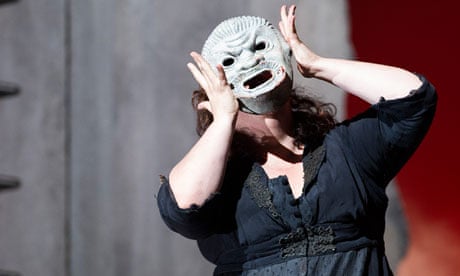You might find yourself with mixed feelings about the Royal Opera's latest revival of Elektra. Immensely powerful, if at times flawed, it marks the third outing for Charles Edwards's 2003 staging of Strauss's terrifying psychological masterpiece. Edwards has subjected his production to painstaking revision on each appearance. In this instance, however, the changes aren't always advantageous.
The concept, in outline, remains the same. The opera is relocated to the Weimar Republic, where Klytämnestra (Michaela Schuster) and Aegisth (John Daszak) are the decrepit remnants of a pre-war aristocracy, while Christine Goerke's Elektra and Iain Paterson's Orest embody a brutalised younger generation with a potential for even greater atrocity than their elders.
When it was last seen in 2008, politics and psychodrama were finely balanced. This time round, a symbolist note has crept in and the focus has blurred. The bloodied Fifth Maid (Jennifer Check), emblematic victim of everyone's violence, now crawls about on stage throughout, and gets distractingly in the way at climactic moments. Klytämnestra's druggy hyperactivity, also new, sits uneasily with the score, robbing the work's central confrontation of some of its force.
Yet you have to hear it, above all for Goerke's shattering performance in the title role and Andris Nelsons's powerhouse conducting. Goerke's voice rides Strauss's vast orchestra with phenomenal ease, and even though bitterness, contempt and loathing are etched unforgettably into her tone, she sings a role often shouted expressionistically with an extraordinary sense of line. Nelsons's interpretation is eruptive yet lyrical, offsetting a nightmare present with heartbreaking memories of past happiness. Adrianne Pieczonka's Chrysothemis is vocally thrilling, if less sympathetic than some. Paterson's tremendous Orest is a real psychopath: horribly disturbing. Goerke makes it unmissable, whatever you think of the rest of it.

Comments (…)
Sign in or create your Guardian account to join the discussion